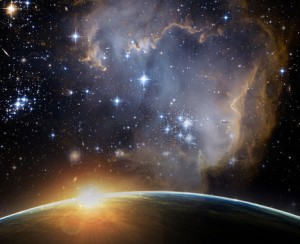Being in Love
 Aristotle observed that all was in motion. Everything was in a process of change.
Aristotle observed that all was in motion. Everything was in a process of change.
The cup was full, but now is empty — emptied by the drinker. The tree once standing, has fallen — the stream having eroded the bank that supported it. The arrow, once still, flies — propelled from the taut bowstring.
But before that, the cup was a lump of clay in the hand of a potter. The stream was diverted by a beaver dam. The bow was bent by the archer. Always a prior movement and prior change. Aristotle realized that we could not go back like that forever. At some point we had to come to an originator of all this motion. An originator which could not have been set in motion by anything else. A Prime Mover, Unmoved. This is the god of the philosophers.
Thomas Aquinas liked what Aristotle had done. He thought the reasoning quite sound, but that Aristotle had missed something. The question is not merely what causes the motion of things. But what causes the things. For it is not merely that all around us we see things which are dependent on something else for their motion, they are dependent upon something else for their very existence. They are contigent.
What we need is not merely a Prime Mover Unmoved, but Being Uncontigent. That is, Being which depends on nothing else. Being itself. But in order for this Being, depending upon no one and nothing else for existence, to share this quality of existence with all other things — contingent things — an act of will is required. Being itself must will to bring other things into existence. Therefore Being itself must be personal because will belongs to persons.
This Personal Being must be Spirit because all persons who possess bodies are contingent beings, dependent upon something outside of themselves to come into being and remain alive. So God is Spirit.
Other things logically follow — God must be perfect, for as the source of all Being He can lack nothing and His perfection extends to all aspects of His Being including His knowledge and His power.
Having come with Aquinas this far, we know that there is a God. We know that God is a person. But we don’t know God personally. We don’t know what kind of person God is. And we have come as far as we can, as far as our senses and intellect can take us. In order to know God personally, we must wait for Him to reveal Himself because we cannot make contact with spirit through any of our senses. We must wait and listen for this God to reveal Himself to us.
Then, wonder of wonders, this God does reveal Himself. He speaks His Word. His Revelation bridges that gap between the spirit realm and our senses. He comes into our world, taking our nature, so human senses can behold and hear and touch Him. His Word comes as God because it is the self-revelation of God, and comes as Man because it is spoken to men. We call this coming the Incarnation.
The Incarnation and the Life, Ministry, Crucifixion, and Resurrection of Christ, reveal to us that this Personal God is three Persons united in a relationship of love. Being, then, is Love.
Existence is communicated to all contingent things — including human persons — by an act of love. Everything that is depends on God’s love to exist.
“God is love.” This is the God of the Catholic Church. This is the only God there is.
(© 2011 Mary Kochan)

